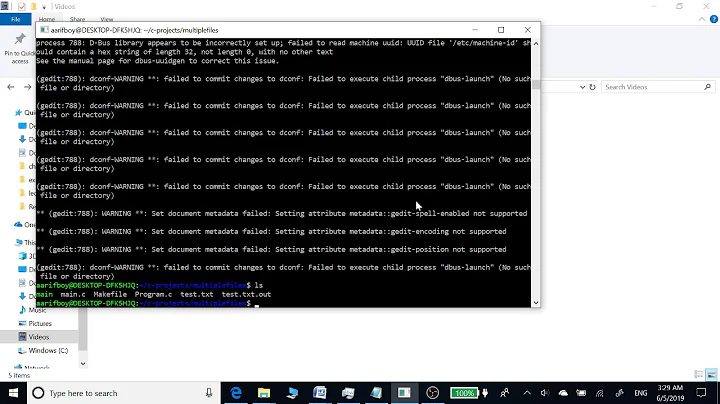minimum c++ make file for linux
Solution 1
If it is a single file, you can type
make t
And it will invoke
g++ t.cpp -o t
This doesn't even require a Makefile in the directory, although it will get confused if you have a t.cpp and a t.c and a t.java, etc etc.
Also a real Makefile:
SOURCES := t.cpp
# Objs are all the sources, with .cpp replaced by .o
OBJS := $(SOURCES:.cpp=.o)
all: t
# Compile the binary 't' by calling the compiler with cflags, lflags, and any libs (if defined) and the list of objects.
t: $(OBJS)
$(CC) $(CFLAGS) -o t $(OBJS) $(LFLAGS) $(LIBS)
# Get a .o from a .cpp by calling compiler with cflags and includes (if defined)
.cpp.o:
$(CC) $(CFLAGS) $(INCLUDES) -c $<
Solution 2
Here is a generic makefile from my code snippets directory:
SOURCES=$(wildcard *.cpp)
OBJECTS=$(SOURCES:.cpp=.o)
DEPS=$(SOURCES:.cpp=.d)
BINS=$(SOURCES:.cpp=)
CFLAGS+=-MMD
CXXFLAGS+=-MMD
all: $(BINS)
.PHONY: clean
clean:
$(RM) $(OBJECTS) $(DEPS) $(BINS)
-include $(DEPS)
As long as you have one .cpp source producing one binary, you don't need anything more. I have only used it with GNU make, and the dependency generation uses gcc syntax (also supported by icc). If you are using the SUN compilers, you need to change "-MMD" to "-xMMD". Also, ensure that the tab on the start of the line after clean: does not get changed to spaces when you paste this code or make will give you a missing separator error.
Solution 3
Have you looked at SCons?
Simply create a SConstruct file with the following:
Program("t.cpp")
Then type:
scons
Done!
Solution 4
Assuming no preconfigured system-wide make settings:
CXX = g++
CPPFLAGS = # put pre-processor settings (-I, -D, etc) here
CXXFLAGS = -Wall # put compiler settings here
LDFLAGS = # put linker settings here
test: test.o
$(CXX) -o $@ $(CXXFLAGS) $(LDFLAGS) test.o
.cpp.o:
$(CXX) $(CPPFLAGS) $(CXXFLAGS) -c $<
test.cpp: test.h
Solution 5
a fairly small GNU Makefile, using predefined rules and auto-deps:
CC=c++
CXXFLAGS=-g -Wall -Wextra -MMD
LDLIBS=-lm
program: program.o sub.o
clean:
$(RM) *.o *.d program
-include $(wildcard *.d)
Related videos on Youtube
RichieHH
Updated on January 28, 2020Comments
-
RichieHH about 4 years
I've looking to find a simple recommended "minimal" c++ makefile for linux which will use g++ to compile and link a single file and h file. Ideally the make file will not even have the physical file names in it and only have a .cpp to .o transform. What is the best way to generate such a makefile without diving into the horrors of autoconf?
The current dir contains, for example
t.cpp t.h
and I want a makefile for that to be created. I tried autoconf but its assuming .h is gcc instead of g++. Yes, while not a beginner, I am relearning from years ago best approaches to project manipulation and hence am looking for automated ways to create and maintain makefiles for small projects.
-
 Martin York over 15 yearsMake is great for simple projects (and for playing with). But maintaining a big project becomes difficult to do correctly (you can hodge podge it easily but correctly is hard). Use tools 'like scons' to build your make file
Martin York over 15 yearsMake is great for simple projects (and for playing with). But maintaining a big project becomes difficult to do correctly (you can hodge podge it easily but correctly is hard). Use tools 'like scons' to build your make file -
RichieHH over 15 yearsscons looks nice. Certainly easier than Autoconf.
-
bltxd over 15 yearsOMake is great and takes over when make shows its limits.
-
-
 David Nehme over 15 yearsthis also doesn't create any dependencies.
David Nehme over 15 yearsthis also doesn't create any dependencies. -
 Martin York over 15 yearsThough I love fiddling with makefile (its a language unto itself). I think this is the best answer, but I think you need to expand this answer a bit to explain why using "SCons" is better than using Makefiles directly. I am convinced but there is not enough here to convice others.
Martin York over 15 yearsThough I love fiddling with makefile (its a language unto itself). I think this is the best answer, but I think you need to expand this answer a bit to explain why using "SCons" is better than using Makefiles directly. I am convinced but there is not enough here to convice others. -
RichieHH over 15 yearsBut why do you have specific rule for t: ? It kind of defeats the point of having a cpp.o rule.
-
RichieHH over 15 yearsAgain this his a specific line for test. Why?
-
hazzen over 15 yearsThe t rule generates, from the .o files, the binary by calling the linker. If I had four sources [abcd].cpp and a binary named t, the rule would link all four of those generated objects into one executable.
-
Alnitak over 15 yearsbecause you always have to specify what the Makefile will actually build. With suitable global defs, you might just be able to say just "test:" in the file, but the file above is guaranteed to work regardless of any global rules or macros.
-
JesperE over 15 yearsIf OMake had better support for out-of-source builds and could generate Visual Studio project, it would be very close to perfect.
-
bltxd over 15 yearsWe do out-of-source builds with OMake here. There are a few things to know but otherwise it works (0.9.8.5).
-
jdkoftinoff about 9 yearsOops! Sorry for the broken links. I moved it to github. github.com/jdkoftinoff/magicmake - that being said I use CMake now instead.
-
 KRoy about 6 years
KRoy about 6 yearsallshould bephonytoo . -
Daniel Stevens over 5 yearsYou should use
CXXandCXXFLAGSfor C++ files, rather thanCCandCFLAGS. Source: GNU make implicit variables. Note thatCPPFLAGSare for the C Pre-Processor, which applies to both C and C++. -
Daniel Stevens over 5 years








